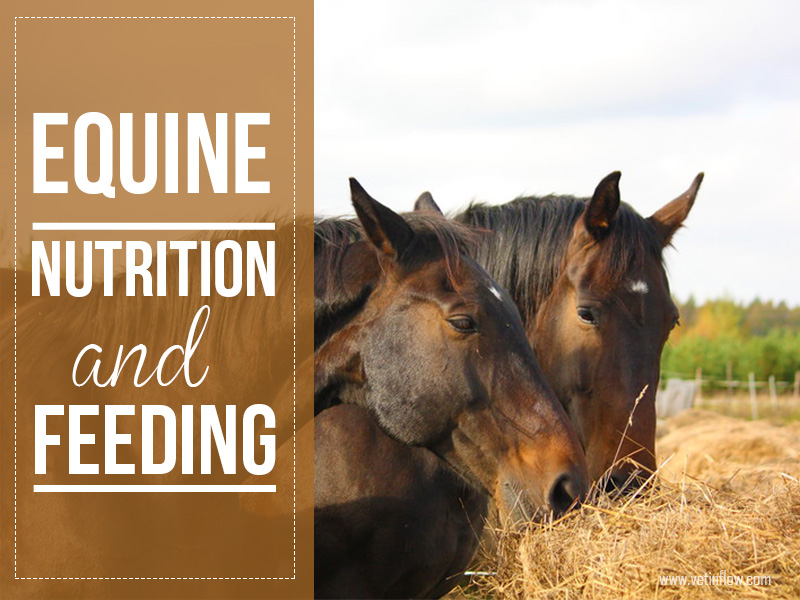
Equine nutrition and feeding
An appropriate diet and balanced nutrition is essential for a horse's healthy development, overall well-being and long term health. In general, the equine diet must include carbohydrates, proteins, minerals, vitamins and water.
A horse's dietary requirements will depend on its age, size, physiologic state and amount of work performed. Exercising, working or growing horses as well as lactating mares will have higher demands for energy so their feed intake should be adjusted according to their needs. Horses that are overweight, ill or ageing will need specific diet adjustments as well.
The most important part of all feeding programs for horses is good quality grasses, hay or forage. This is an invaluable source of energy, nutrients and fibre that also plays an essential part in teeth wear and good intestinal motility. Hay must be stored properly to avoid mould, dust and rodents. It is also very important to remember that high quality hay encourages a horse's appetite.
In general, forages are classified as grasses (such as timothy, orchard and brome) and legumes (such as clover or alfalfa). Legumes usually contain more protein, calcium, and energy than grass hay.
In order to achieve a balanced diet, you may need to add concentrates (compound mix) to provide any nutrients that might be missing from the forage. Concentrates include all grains (such as oats, corn or barley) and are high in protein and energy. Grain should be fed in small amounts as it can upset a horse's digestive system.
A horse's diet must also include mineral supplementation for adequate bone development and good general health. Horses need adequate amounts of calcium and phosphorus as well as trace minerals such as iodine, copper, iron, manganese and selenium.
Commercial feeds usually have the appropriate amount of minerals and vitamins added to meet a horse's requirements and horses that consume fresh green pasture will also receive proper amounts of minerals in their diet, except for salt. Horses should have access to free choice salt and clean water to drink at all times.
Horses regularly subjected to moderate to intense work lose electrolytes (sodium, potassium, and chloride) in their sweat. In these particular cases it may necessary to supplement both salt (sodium and chloride) and potassium.
Another relevant topic is the calcium : phosphorus ratio. The body's response to high levels of phosphorus in the blood stream is to withdraw calcium from the bonesto balance the calcium : phosphorus ratio, so it's important to keep the phosphorus within normal levels. When buying commercial feeds or premixes it is very important to check if the calcium : phosphorus ratio is between 1:1 and 2:1.
Grazing animals do not have to deal with this issue since phosphorus is fairly low in grasses but grains, on the other hand, are very high in phosphorus.
Horses need to have Vitamin A, D and E in their diet. Good quality hay, fresh green forages and/or premixed rations often contain all the necessary vitamins for a horse.
Body condition scoring is an important tool to monitor your horse's weight. The ideal body condition score for a horse is between 4 and 5 (on the 9-point scale, with 1 being extremely thin and 9 being extremely fat). As a general rule your horse's ribs should not be visually distinguished but should be easily felt.
Your horse's feed intake and amount of exercise should be managed according to your horse's body condition score and weight. Please remember that overweight horses are more susceptible to conditions such as laminitis, exercise intolerance, inefficient thermoregulation (over-heating) and metabolic disorders.
It is also very important to keep in mind that the equine gastrointestinal tract is not prepared to go without food for any period of time. If it is not possible for a horse to have free access to grass or hay (forage) or to be offered frequent, small meals throughout the day, then it should be fed at regular intervals in order to reduce the amount of time its digestive tract is empty.
If you need to make any changes in horse's diet please make sure those are introduced gradually over a 7 to 10 day period, so the horse's digestive system has time to adjust.
We have a new course about equine nutrition and feeding! Have a look at the course's description here!
Would you like to know more about horses? Check our Equine Courses:
Equine courses
Read the previous article: Raising awareness about the dangers of giving pets human medication


